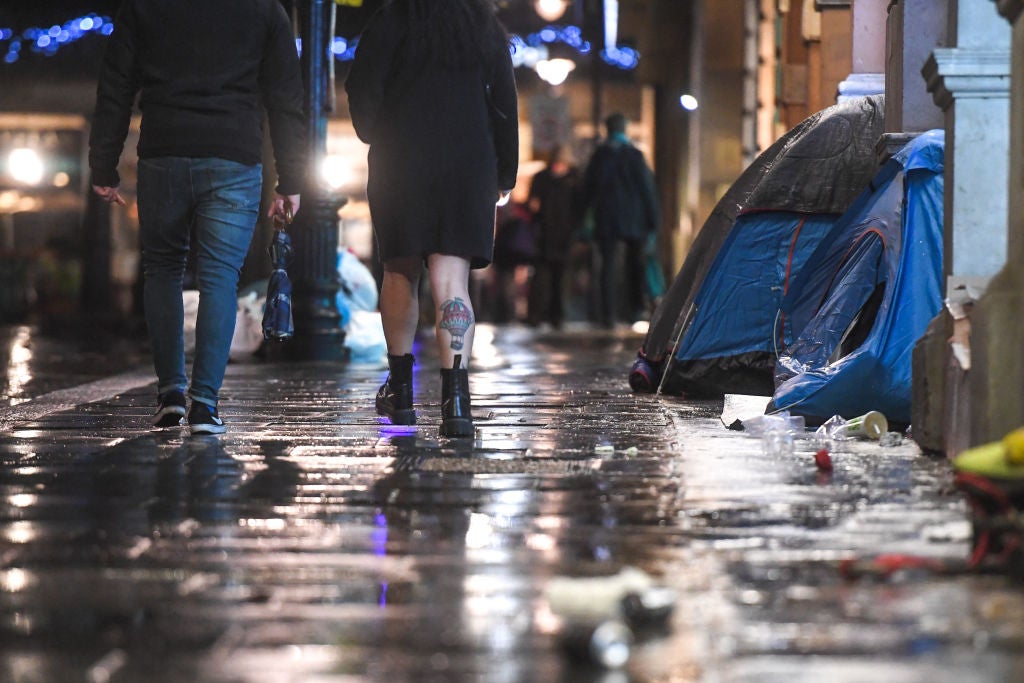One in seven adults worried they will become homeless due to pandemic, research shows
More than a quarter of private renters surveyed say economic situation makes them fear losing their home, fuelling concerns about impending homelessness crisis

One in seven adults are worried about becoming homeless due to the pandemic, new research indicates, fuelling concerns that ministers are not doing enough to protect renters from losing their homes.
The results of a survey of more than 3,500 adults in England, published by Shelter, reveal 14 per cent said the current economic situation had made them more worried about losing their homes – which when extrapolated to the wider population amounts to more than 6 million people.
Of private renters surveyed, 27 per cent said they were concerned about becoming homeless and that they had seen their income decrease in the last six months. One in four said they had had to borrow money in order to pay their rent and 18 per cent reported having to cut back on meals.
Landlords are currently required to provide a six-month notice period to evict tenants – a measure that was introduced in response to Covid-19 and is due to end on 31 May.
Campaigners warn that once the measure is lifted, thousands of people will lose their homes, and are calling for the government to provide more financial support to tenants to ensure they can pay off their rent arrears.
Read more:
Charities say many people have already fallen homeless despite the ban on evictions, where for example their accommodation was linked to their job or where they had precarious living arrangements that have ended during the pandemic.
Shadow housing secretary Thangam Debbonaire said renters had been “barely considered” throughout the pandemic, and called on ministers to strengthen the ban on evictions and deal with the “growing arrears crisis”.
“The government promised that no one will lose their home because of coronavirus, but holes in their so-called evictions ban mean thousands of people have been made homeless at the height of the pandemic,” she said.
The new research, conducted by YouGov, shows that nearly half of private renters said they were more depressed and anxious about their housing situation in light of the pandemic, compared with 26 per cent of the general public.
Shelter’s frontline services data shows two-thirds of calls answered by its emergency helpline in the last year were from people already homeless or at risk of homelessness.
In order to meet demand for its emergency services, the charity has already taken on 26 new housing advisers and doubled the number of calls answered by its free helpline, and has launched an urgent appeal for public support.
Eleanor Wilson, who started working as a helpline adviser for Shelter in September, said the amount of calls she received from people who are “teetering on the edge of homelessness” was “relentless”.
“People are frightened, they’re scared they might do the wrong thing, they don’t know their rights and they’re really worried they will lose their home,” she said.
“I’ve got people off sleeping on the streets, kept people from being illegally evicted, and found last minute emergency accommodation for families facing homelessness that very night.”
Read more:
Dan Wilson Craw, deputy director of Generation Rent, warned that without government action, thousands of renters would lose their homes once the economy opens back up and eviction restrictions are lifted.
“The pandemic has caused the number of private renters relying on universal credit to pay their rent to soar, but support is so stingy more than half don’t get enough to cover their costs,” he said.
Darren Baxter, housing policy and partnerships manager at the Joseph Rowntree Foundation, raised concern that the temporary eviction ban was “the only dam holding back a flood of evictions”, and that once it is removed in May there will be a “wave of repossessions and a surge in homelessness”.
He accused chancellor Rishi Sunak of “remaining silent” on support for rent arrears in the Budget earlier this month, instead freezing housing benefit levels and prioritising policies that would maintain high house prices.
“If it is to make good on its commitment to end homelessness, the government must introduce a targeted package of support to address high rent arrears and re-link housing benefit levels to the real cost of renting,” he added.
A government spokesperson said: “We’ve put households at the heart of our decision-making throughout the pandemic, with an unprecedented £352bn package keeping millions in work and temporarily bolstering the welfare safety net by more than £1,000 a year for families most in need.
“Robust protections remain – with longer notice periods of six months and the banning of bailiff enforcement of evictions for all but the most serious cases until 31 May – councils can also provide support through the £180m discretionary housing scheme.”
The discretionary housing scheme can provide extra money to a tenant where their local council decides they require additional help to meet housing costs.
Subscribe to Independent Premium to bookmark this article
Want to bookmark your favourite articles and stories to read or reference later? Start your Independent Premium subscription today.

Join our commenting forum
Join thought-provoking conversations, follow other Independent readers and see their replies